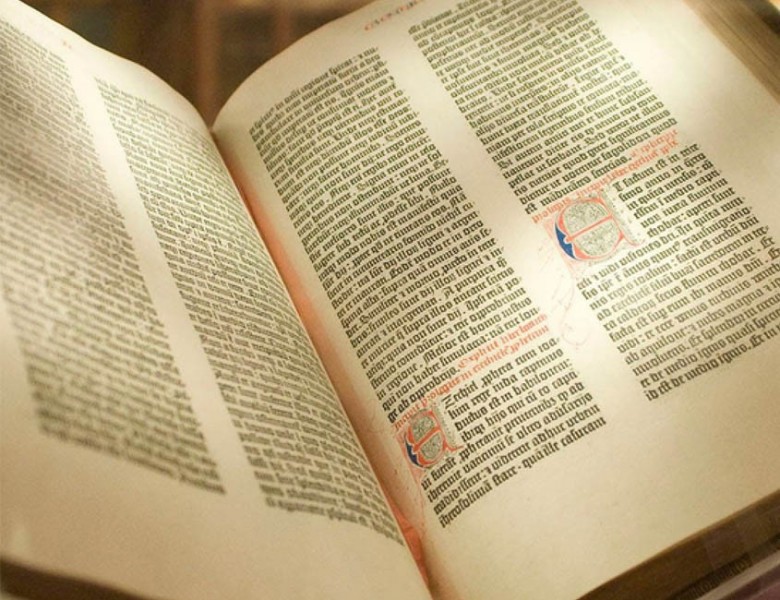UST’s Very Own Gutenberg Bible Arrives
 Precious few Gutenberg Bibles exist in the world. Now, UST has its own perfect facsimile. This magnificent facsimile from Pelplin, Poland is a true and rare reproduction to ultimately be housed and displayed in the University’s Doherty Library.
Precious few Gutenberg Bibles exist in the world. Now, UST has its own perfect facsimile. This magnificent facsimile from Pelplin, Poland is a true and rare reproduction to ultimately be housed and displayed in the University’s Doherty Library.
Gutenberg Significance at UST
The University’s Dean of Libraries Jim Piccininni said, “The Gutenberg will serve as an institutional icon, whose written word represents the blending of Faith and Reason, a guiding principle for why this University was founded.”
The significance of the Gutenberg Bible at UST cannot be overstated.
UST’s Gutenberg Bible visionary Lowell Davis ’10 said, “Sacred Scripture as the word of God is the written foundation of the being and doing of any Catholic university. The Vulgate bible of St. Jerome is still the biblical language of all the teachings of the Church and her liturgy. The Gutenberg Bible is the first book of all libraries since 1455. It is the symbol and perennial role of a Catholic university in the life of the city of Houston, the State of Texas and the country.”
A Rare Representation of Technology and Innovation
Merely 45 known complete copies of the Gutenberg bible survive of the original 185 published. These are priceless. Facsimiles are few. The edition of the copy at UST is the only one in the city’s universities and colleges.
The invention of movable type by Johannes Gutenberg in 1450 marked a revolution in communication. And the first book to use the trailblazing technology was the Bible, signaling a new era in which its everlasting words would be available to everyone, not just the wealthy and clergy. The Gutenberg Bible is hailed for its historical significance as well as its breathtaking artistic beauty.
Dr. Charles Stewart, former Professor of Art History, recommended the Pelplin edition, the Latin translation of St. Jerome, to UST’s Gutenberg Bible Committee. Chair of the Committee Connie Little, ’61, Associate Professor of Sacred Scripture Fr. Dempsey Acosta-Rosales, and Madelyn Farris, of the UST Doherty Library family lead fundraising for the project.
Lowell explained, “In the third century B.C., 72 scholars translated the Hebrew text into Greek in 72 days. So, our plan is for seventy-two “wise” donors to fund the acquisition and be named the “New Septuagint 72.” These friends of the library will be listed in a special location on the display, which will be revealed at a dedication and installation on November 9.”
More than half of the funds for UST’s Gutenberg have been raised. Anyone who wishes to donate to this project may inquire with Meredith McCrary.





